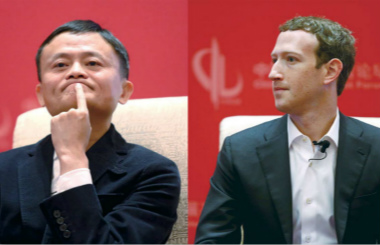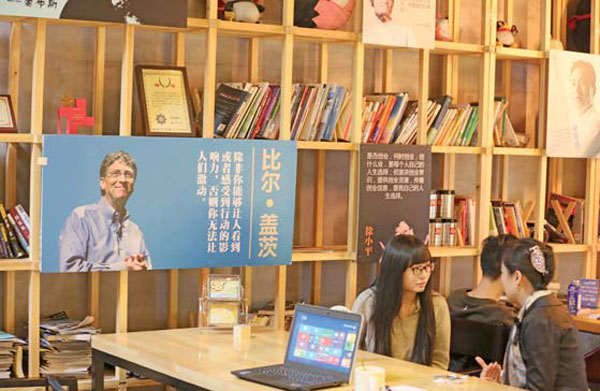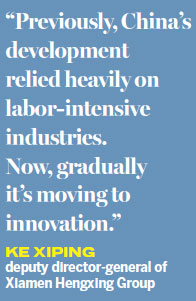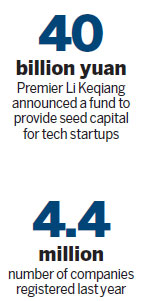A fresh start
Updated: 2016-04-01 08:28
By Hu Haiyan(China Daily Europe)
|
|||||||||
|
Young businesspeople talk at a meeting place for budding entrepreneurs and angel investors in Zhongguancun Haidian Science Park. [Photo provided to China Daily] |
Sowing the seed
The Chinese government is keen to see more like Li Gang.
As the country shifts from relying heavily on exports and infrastructure investment, policymakers are channeling their energies into boosting innovation and industrial modernization.
Premier Li Keqiang has called for "mass entrepreneurship" in his past two annual Government Work Reports to the national legislature. Last year, he announced a 40 billion yuan fund to provide seed capital for tech startups.
Innovation has also been placed at the core of the 13th Five-Year Plan (2016-20), the blueprint for China's development till the end of the decade. Over this period, the amount of expenditure on research and development is aimed at 2.5 percent of GDP, up from 2 percent in 2015.
Many have already answered the government's call. Official data show 4.4 million companies were registered last year, an average of 12,000 a day, with 90 percent started by individuals.
"Thanks to the efforts to stimulate mass entrepreneurship and innovation, startup businesses are no longer the preserve of a few wealthy people," says Ke Xiping, deputy director-general of Xiamen Hengxing Group, which has interests in real estate, mining, and trade and investment.
Ke operates the Aite Innovation Incubator in the southern city of Xiamen, Fujian province, which supports startups focused on breakthroughs in the Internet industry and consumption channels.
China is cultivating an innovation wave, "with startups mushrooming in many fields, not only in mobile apps and websites", Ke says. "Previously, China's development relied heavily on labor-intensive industries. Now, gradually it's moving to innovation.
"And it's not only in cities like Beijing and Shanghai. In second- and third-tier cities like Xiamen there is also a boom in startups and investors. There are also huge numbers of hardworking startup teams, supportive policies and active capital markets, which are essential to helping budding businesses grow."
Yet despite large-scale growth in Chinese startups, the Global Entrepreneur Monitor found that the country still lags behind developed nations in innovation.
In its report, China's young entrepreneurs ranked poorly in terms of adopting new technologies and developing new markets.
"When we interviewed startup business owners in China, they were confident and believed their products are innovative, but really they lack understanding about technological innovation," says Gao Jian, an official with Tsinghua University School of Economics and Management and head of the monitor in China.
"Currently, they're more focused on developing new products or services in traditional industries, such as online-to-offline apps."
China has more than 4,800 innovation incubators nationwide, covering a range of sectors, according to the Ministry of Science and Technology.
Kai-Fu Lee, the former head of Google China and founder of Innovation Works, one of the country's first incubators, in 2009, says he feels Chinese entrepreneurs are catching up with their Western peers and "have the potential to lead the trend in innovation globally in the next 10 years".
However, Lu Jinyong, an economics professor at the University of Business and Economics in Beijing, believes too much emphasis is being placed on the quantity of projects rather than the quality.
"We have so many innovation incubators now, but there is a real shortage in high-tech projects and disruptive innovation," he says, referring to innovations that create new markets that eventually disrupt established ones.
Ultimately, Lu says: "Young people tend to see startups as a favorable career choice to realize their personal value and become financially independent, but too many of them overestimate their capabilities."
Huang Fan agrees. He is president and CEO of Shoujia Group, which owns most of the convenience stores in Xiamen. With about two decades of business experience under his belt, he believes more young people should be made aware of the risks involved in starting a company.
"First, you should be clear on whether you're suited to running a business. Many college graduates have difficulty in finding a job so they choose to start a business, but it's not always a sensible choice," the 36-year-old says.
"It is not easy to start a company. You need to handle many aspects and relationships. For example, you need to know how to sell your ideas to investors, register a company, find sources of funding, prevent your intellectual property from being stolen by potential investors or competitors, and you need a strategy for expansion."
Huang was born to a wealthy family in Xiamen. In 1996, he decided against taking over the family business and instead started his own business.
"I saw it as the most effective way to demonstrate my ability, but it also meant more uncertainty and risk compared with working as an employee at a large company."
Today's Top News
Once-endangered pony makes comeback
Bookshop worms way into community
A fresh start
Bookshops reinvent themselves
Xi-Obama bilateral talk to advance ties
Foreign companies reassured on new Internet rules
Beijing and Prague form new key link
Trump drops pledge to back Republican nominee
Hot Topics
Lunar probe , China growth forecasts, Emission rules get tougher, China seen through 'colored lens', International board,
Editor's Picks

|

|

|

|

|

|









